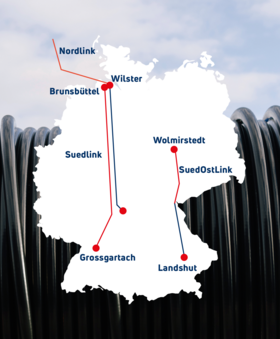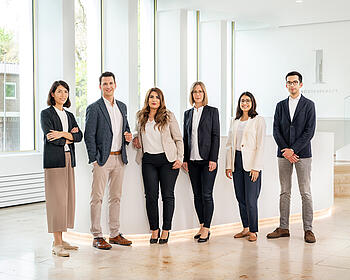Anders Jensen is CTO at cable manufacturer NKT. In this interview, he speaks to Dr Manfred Janssen – CEO of KölnBusiness – about the importance of the company in the energy transition and the advantages of Cologne as a location for the Danish company. He also reveals why he has not become a fervent fan of FC Köln.
It's a regular Thursday morning in the Cologne section of the chemical park: vans, transport services and employees are hurrying along the factory roads; steam is rising from the industrial plants. NKT (Nordiske Kabel- og Traadfabriker) is based here, right on the city boundaries with the neighbouring Leverkusen. The Danish company is known globally for the breadth of its cable products. Here in Cologne, it specialises in the production of high-voltage cables for large power lines. The infrastructure for the energy transition megaproject is manufactured here on an area of around 90,000 square metres. Anders Jensen, Chief Technology Officer (CTO) of the entire group, works from the third floor of the administration building in an office with typically minimalistic Danish vibe. With one exception: a large oil painting showing how cables were once manufactured in Cologne, long before NKT came to the Rhineland.
Mr Jensen, NKT is actually a Danish company, but has had a site in Cologne for many years. From here, you are setting the course for the German energy transition.
That’s right. We manufacture the cables that connect electricity production and consumption for the major energy transition project here at the site.
Could you specify what kind of projects?
NKT produces low-, medium- and high-voltage cables. The latter are particularly important because they are used in the major electricity corridors, such as the SuedLink high-voltage line. This is how we connect Germany's north, where electricity is produced – for example in offshore wind farms – with the south, where a lot of electricity is consumed, for example by industry. In other words: without our cables, a sustainable energy transition is not possible.
And you manufacture all these cables in Cologne?
Partly. There are differences between submarine and onshore cables. The submarine cables that connect offshore wind farms to the mainland must of course be designed and manufactured differently. Here in Cologne, we mainly manufacture the land cables, which are then installed in projects such as SuedLink. This involves more than 700 km of cable that can transmit an output of two gigawatts of power. Not many companies are able to offer something of this dimension. We have often been at the forefront of innovation, especially when it comes to high-voltage cables. We were, after all, the first company to produce 525-kilovolt cables!
NKT has been in Cologne for more than 20 years. Why did you come here in the first place?
In 1999, NKT took over the cable manufacturer Felten&Guillaume from Cologne-Mülheim. This was a milestone for us, as F&G was a company with really valuable cable and accessories manufacturing technology. So we were obviously happy to add it into our portfolio. Cologne is also wonderfully located, right in the very centre of Europe. We can easily reach our EU sales markets from here. The motorway connections are excellent, and the airport is just a stone throw away. And lest we forget: the Rhine. The river is also important to us as a waterway, which flows directly next to our Chempark.
You are now recognised as one of the sector’s most innovative companies. So there is no threat of cheap competition?
Of course - we have competitors who come onto the market with lower prices, especially from China. This is a challenge for us, as there is no fair competition with these companies. They receive state subsidies that do not exist in Europe. I would also like to see some government support here.
In which way, exactly?
It is crucial that a more complex and binding decision-making system is applied to tender processes. Contracts must not be awarded solely on the basis of price. Other criteria such as transport routes and the associated CO2 emissions or environmentally friendly and sustainable production should also be considered.
Have you raised these concerns with the EU?
We have. Ultimately, it's also about a fundamental decision: who benefits from the enormous added value created by the energy transition? Clearly Europe. This transformation is not only a challenge, but also an opportunity. New technologies are needed, and many jobs will be created. But if we are not careful, this will not happen in our continent. We have already seen in the solar industry how things can go when European suppliers disappear and products have to be sourced from outside Europe. This is also not conducive to the energy transition in terms of CO2 emissions due to the long transport routes. In contrast to competitors from other regions of the world, we as a company are committed to ambitious climate targets. By 2030, we want to reduce our emissions by 90% compared to 2019 and are already well on the way to achieving this goal.
What else is NKT doing to maintain its leading market position?
We have recently expanded our capacities and made important investments in Sweden and here at Cologne’s Chempark. In Karlskrona, we have built a 150-metre-high extrusion tower to insulate power cables. And the new test centre has been built in Cologne. These are two flagship projects that symbolise our position in the energy transition and underline our leading position in XLPE and HVDC technology.
What kind of technology is there behind this?
This involves high-voltage DC cables with cross-linked polyethylene-based insulation. This technology is of crucial importance for the expansion of the offshore wind market and the preparation of global power grids for the future demand for green energy. Why is that so? Well, it enables us to transport larger quantities of electricity over longer distances. As part of the investment programme, we have also acquired new machines and an inland vessel called Agrippina, which was specially developed for transporting submarine cables on the Rhine.
Last year, Federal Minister of Economics Robert Habeck visited the Cologne site. Do you feel that you are getting through to politicians with your concerns?
Absolutely, especially here in Germany. During his visit here, I asked Minister Habeck about the fact that the special permits for our cable transports often take a disproportionately long time. He has addressed the issue and we are seeing positive developments since his visit. One thing is clear: the dimension of the energy transition project is massive - if government does not get on board, it will not succeed.
A successful energy transition also requires sufficient access to raw materials. What is the supply situation at NKT?
As with all companies, it is becoming more challenging. Without raw materials such as copper or plastic, there are no cables. We need more suppliers today than we used to in order to secure our supplies. We have just seen how quickly the situation can change. NKT also had suppliers in Ukraine, in the middle of a war zone. So we had to adapt our supply chains. That worked, but was of course time-consuming. After all, we have to fulfil the high-quality standards of the network operators. So we can't just take any supplier, it needs thorough audits.
NKT was recently awarded the contract for two onshore high-voltage cable projects by the German transmission system operator Amprion. This increases the order backlog in the high-voltage sector to around 12 billion euros. What does this mean for the Cologne site?
We will invest around 100 million euros in additional production capacity at the existing plant in Cologne. These are scheduled to go into operation from 2027. We are very pleased about these orders, as they confirm our local commitment, our strong focus on sustainability and our expertise in high-voltage cable systems. They will also help to secure highly skilled jobs in Germany and implement the energy transition.
Which brings us to the shortage of skilled labour. Has it also reached NKT?
Of course. We are searching for skilles labour actively, just like everyone else. And yes, it is a challenge - not just in terms of finding engineers. We also urgently more people in project management and cable design. There are also vacancies in the factory and in the background, in logistics and in plant management.
Is the search for talent easier or more difficult in Cologne than elsewhere?
The location offers a number of advantages. There are many good universities in the region, like the University of Cologne, the Technical University and, of course, RWTH in Aachen. We are present there to actively promote our company. And as far as jobs in production are concerned, there are many industrial companies with factories in the region. Of course, we are not taking employees away from them. But in sectors such as the automotive industry, capacity utilisation fluctuates more than it does for us. If the order situation is weaker there, we can offer people something.
Do you also recruit from outside the region?
We do, especially at top universities within Germany. Dresden is one example, as is Karlsruhe. As a football fan, I like to compare companies with top clubs. We try to attract top players to us, as a kind of transfer target. But our own youth development work here on site is also important. That's the only way a club can be successful, the only way a company can be successful.
Is Cologne attractive to talent from outside the city?
Cologne is an attractive metropolis. In addition, the Bergisches Land region is not far away, all of which is interesting for potential employees. Of course, the lack of housing is a problem, but what big city doesn't have that?
You yourself have lived in Cologne for 15 years. How at home do you feel here?
I feel very much at home here. As a Scandinavian, I had to adjust a little to the local Rhineland character, but it's worth it. Cologne has a great cultural programme and beautiful nature just outside the city gates. As a Dane, I miss the North Sea and the Baltic Sea, but there are mountains here - at least by Danish standards.
And as a football fan, are you now rooting for 1 FC Köln?
I hardly dare say it, but as a Dane who grew up near the German border in the 1970s, I sympathise with Borussia Mönchengladbach. Back then, Allan Simonsen and Henning Jensen, Danish internationals and Bundesliga stars, played there. But it's not far from Cologne to Borussiapark.
Nkt cables for the networking of renewable energies
NKT is the main supplier for two electricity corridors that are indispensable for the energy transition in Germany.
 The SuedOstLink is the world's first major commercial interconnector to secure the electricity supply in the south-east of Germany. The link comprises a total of 1,100 kilometres of cable. NKT has been awarded the contract for three of the five sections.
The SuedOstLink is the world's first major commercial interconnector to secure the electricity supply in the south-east of Germany. The link comprises a total of 1,100 kilometres of cable. NKT has been awarded the contract for three of the five sections.
At 1,340 kilometres, SuedLink will be the longest underground power connection in the world. NKT has been awarded the contract for the longer of the two power cable sections.
The western section has a total length of 750 kilometres.
Made in Cologne
In our new edition of “Made in Cologne”, you can read more exciting articles about the business world in Cologne.




